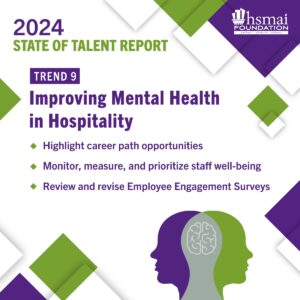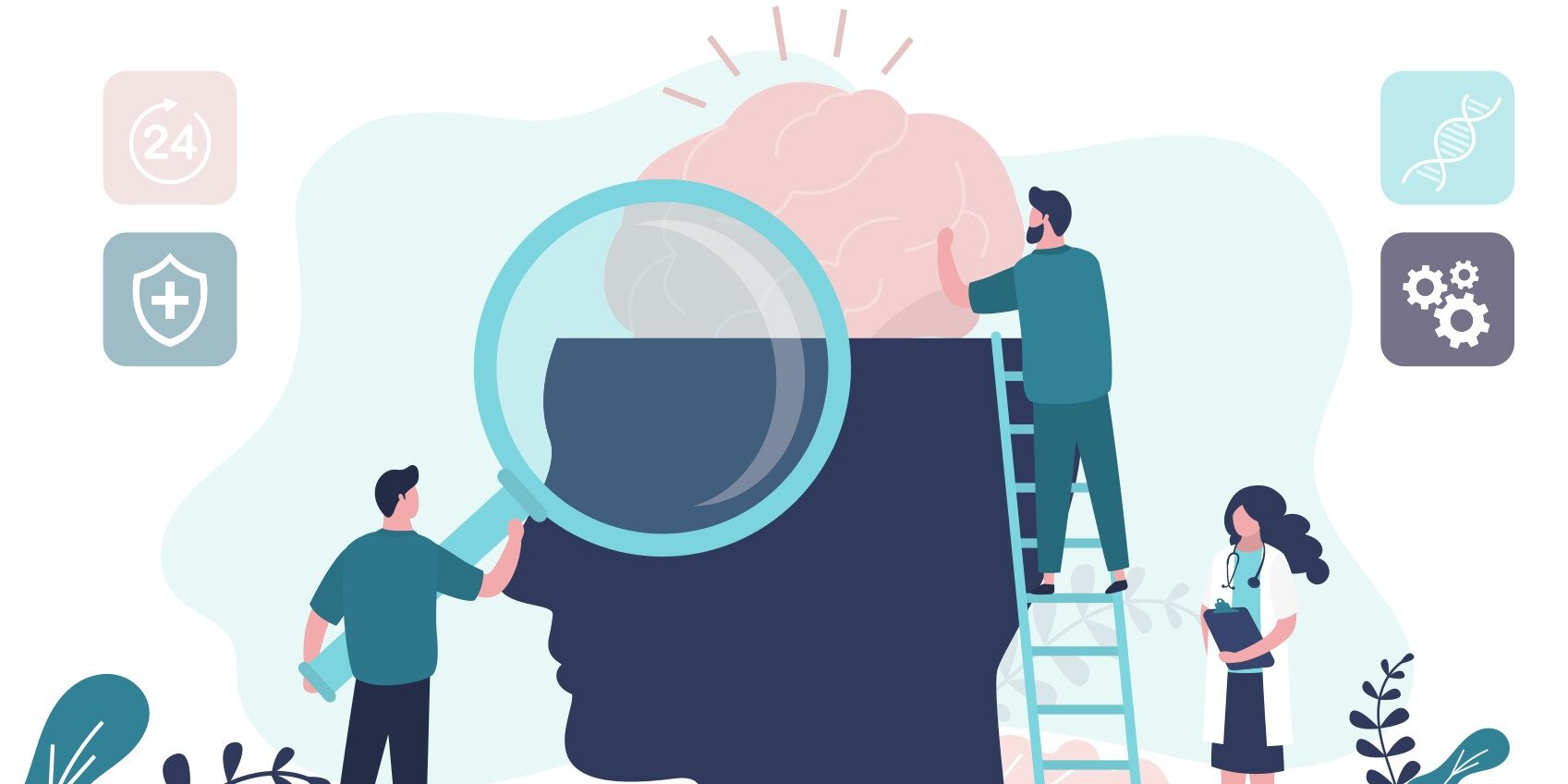The concept of mental health and well-being has taken center stage as an indispensable requirement for employers. The Hospitality Sales and Marketing Association International (HSMAI) has emerged as a trailblazer in identifying and advocating for this crucial trend. As industry leaders grapple with the challenges of burnout and the increasing importance of nurturing the holistic well-being of their employees, the emphasis on mental health and well-being remains paramount. We explore this in the excerpt from the HSMAI Foundation Special Report: The State of Hotel Sales, Marketing, and Revenue Optimization Talent 2023-2024.
 The paradigm of leadership has evolved significantly. The traditional notion of “soft skills” has given way to what is now referred to as “human skills.” These human skills encompass empathy, communication, and a profound understanding of the mental and emotional needs of the workforce. Today’s successful leaders recognize that these skills are not merely optional but are pivotal in nurturing a thriving and engaged team. In an era of multi-generational workforces, acknowledging and valuing the mental and physical well-being of employees while celebrating their individuality has become a linchpin for success. Fostering a workplace culture that prioritizes the personal growth and happiness of employees is instrumental in ensuring that they are not only content but also empowered to excel in their respective roles.
The paradigm of leadership has evolved significantly. The traditional notion of “soft skills” has given way to what is now referred to as “human skills.” These human skills encompass empathy, communication, and a profound understanding of the mental and emotional needs of the workforce. Today’s successful leaders recognize that these skills are not merely optional but are pivotal in nurturing a thriving and engaged team. In an era of multi-generational workforces, acknowledging and valuing the mental and physical well-being of employees while celebrating their individuality has become a linchpin for success. Fostering a workplace culture that prioritizes the personal growth and happiness of employees is instrumental in ensuring that they are not only content but also empowered to excel in their respective roles.
This report aims to shed light on the current state of mental health in the workplace using current data including LYRA 2023 State of Workforce Mental Health, The Conference Board, Employee Benefit News, and Hospitality Net. (HSMAI, 2023) (Srini Pillay, 2023) (Lyra Health, 2023) (Lyra Health, 2023)
Workforce Mental Health
Based on the Lyra 2023 State of Workforce Mental Health report, depression and anxiety disorders have been recognized as the most common forms of mental illnesses in the workplace. These conditions have a significant impact on workers’ productivity, engagement, and overall performance. Furthermore, a substantial percentage of employees exhibit signs of burnout and stress, manifesting poor concentration, discontent, and adverse work relationships.
The top five insights from the 2023 study are:
- Most workers face mental health struggles but, for a myriad of reasons, many don’t get help.
- Many employees struggle to get the right care.
- More people are discussing mental health at work, propelling a culture shift.
- Managers lack needed mental health resources.
- Employees are increasingly stressed and burned out, signaling a need for better work design.
The Lyra report spotlights that nearly 20% of the workforce experiences a diagnosable mental health condition like depression or anxiety disorder. Between 16% and 68% of employees with these conditions do not seek treatment due to worries about confidentiality, fear of negative career impacts, and the stigma associated with mental health. The report recommends implementing various approaches to address mental health support in the workplace.
- Listen to your employees and encourage dialogue around mental health.
- Ensure access to effective care.
- Unlock access to care for serious mental health conditions.
- Support both parents’ and children’s mental health.
- Give managers the mental health training and resources they need.
- To combat burnout, design better work conditions.
Impacts of Mental Health on Productivity
The research from The Conference Board (Srini Pillay, 2023) emphasizes that mental health issues significantly affect workforce productivity. The results of the survey showed that nearly onethird of employees felt a lower level of mental health, employee engagement, and a sense of belonging than just six months prior. Traditional approaches to treating mental health have not been as effective as intended – only 29 percent of employees judged them as being useful. This finding was echoed in the C-Suite where only 25 percent of executives judged them as helpful.
The Conference Board Report viewed personalized treatment using AI as a possible way to address the mental health crisis. Using Bank of America as an example, AI driven, virtual reality therapeutic platforms help reduce feelings of stress and anxiety measured over a six-month period.
Factors identified as contributing to mental health issues included:
- increased work hours (48% of workers who reported decreased mental health worked 50+ hours a week, with 49% of women saying increased workloads/hours hurt their mental health, compared to 39% of men),
- heavy workloads (50% of millennials say their workload/hours hurt their mental health, compared to 48% of Gen X, and 40% of baby boomers),
- poor workplace communication (42%),
- lessened ability to balance the demands of work and personal life,
- time spent in meetings (40%),
- and toxic workplaces (26%).
The report (Srini Pillay, 2023) discusses the importance of destigmatizing mental health in the workplace and underlines the role of management in this regard. It places significant emphasis on building a supportive culture where employees feel comfortable seeking assistance if required. It estimates depression costs to Fortune 500 companies, contributing to $210.5 billion of lost productivity due to absenteeism. By investing in mental health care at work, employers could save up to $8,000 per employee per year. Mental Health in the Hospitality Industry: According to an article on Hospitality Net, (HSMAI, 2023) employees in the hospitality industry appear to suffer more than average from mental health issues. The stress of irregular hours, customer service pressures, and lack of job security contribute to higher levels of depression and anxiety among these workers. In an industry-specific context, employees in the hospitality industry face unique mental health challenges. The uncertainty and stress tied to roles in hotels, restaurants, and other service-driven jobs contribute to elevated depression and anxiety levels. Unconventional working hours, high pressure, and the need to maintain a hospitable front while handling customers are all significant mental health stressors. The report suggests an immediate need for support, training, and sensitization efforts to manage the same efficiently.
Employees seek:
- Work/life balance and manageable stress.
- Tools to evaluate their own mental health in their decisions to stay or leave.
- Help with feeling extremely vulnerable, especially early career employees.
- A rewarding and meaningful career that challenges them without demanding the sacrifice of health and balance in their lives.
- Leaders who demonstrate empathy.
Things that need to be done:
- Realign guest-centricity to meet guest expectations around health, safety, and wellbeing.
- Highlight career path opportunities along with personal and professional growth to help build a talent pipeline and retain valued team members.
- Monitor, measure, and prioritize staff well-being to create healthy workplaces and teams.
- Review your Employee Engagement Survey to ensure it asks relevant health and well-being questions.
Today, employers must prioritize mental health as a core aspect of a healthy and productive workplace. It requires a comprehensive, multi-faceted approach inclusive of supportive workplace policies, open dialogues about mental health, and accessible mental health resources. By addressing workplace mental health, companies also invest in their productivity, employee satisfaction, and retention, contributing to a more conducive environment for all stakeholders. The focus on mental health in the workplace is not merely a trend but a necessary shift towards nurturing a healthy and productive workforce.
Key Takeaways
- Employee well-being and mental health are on the top of leadership priorities today to support a more productive and resilient workforce.
- Fostering a workplace culture that prioritizes personal growth and happiness of employees is part of the lifestyle contract that todays’ employee values.
- Leaders need to ensure their employee engagement surveys provide insights into employee well-being.
To read more about the top talent trends, download the HSMAI Foundation Special Report: The State of Hotel Sales, Marketing, and Revenue Optimization Talent 2023-2024.
